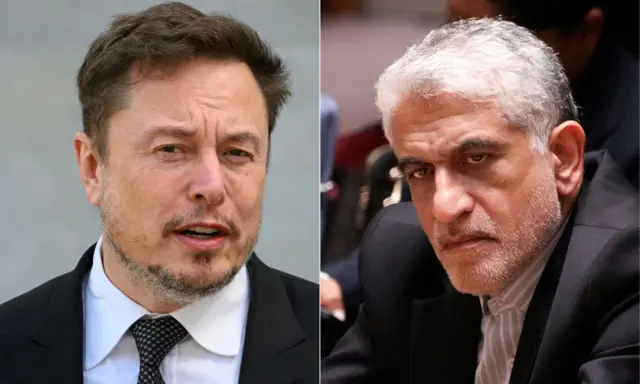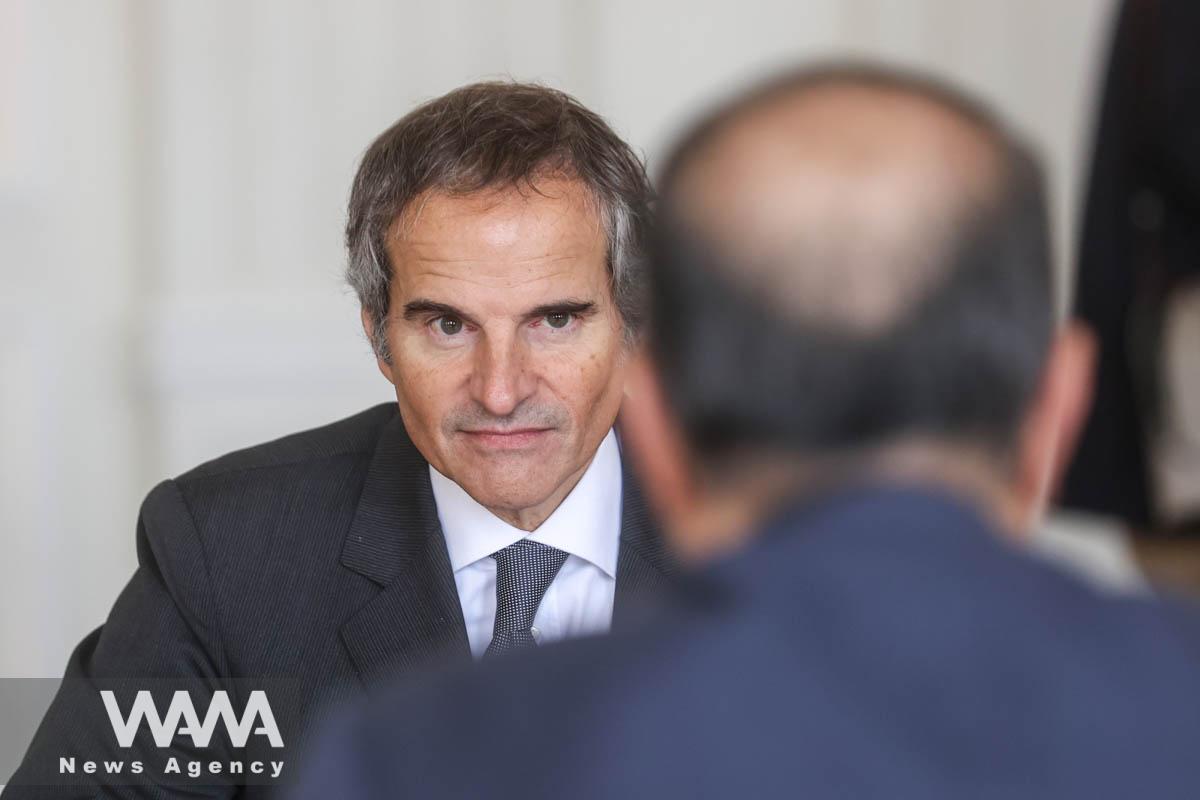Araqchi: Negotiations with Europeans Likely to Start Soon
WANA (Nov 17) – Iranian Foreign Minister Abbas Araqchi rejected claims by American media about a supposed meeting between “Elon Musk” and Iran’s ambassador to the United Nations. He emphasized that European countries have shown interest in resuming talks, adding that negotiations may start soon.
During a televised interview, Araqchi discussed various regional and international issues. Reflecting on his regional trips about a month ago, he explained that the visits occurred during a tense and critical time. The goal was to reaffirm support for the resistance front in Lebanon and Palestine and demonstrate Iran’s strength.
Unified Regional Voice Against Israeli Threats
Araqchi noted that Hezbollah has regained its field strength, despite extensive propaganda against it at that time. These visits highlighted Hezbollah’s resilience, affirming that even if its leadership faced challenges, its operational capacity remained intact.
He also pointed out a unified regional stance against the Israeli regime’s threats, emphasizing that this consensus has effectively restrained Israel’s military aggressions.

OIC Emergency Summit in Riyadh: Islamic and Arab Leaders Unite Against Israeli Aggression
WANA (Nov 11) – The second emergency meeting of the Organization of Islamic Cooperation (OIC) and the Arab League began in Riyadh, with officials from over 50 Muslim countries in attendance. This meeting, proposed by Iran and facilitated by Iran’s Foreign Minister, gathers leaders of Arab and Islamic countries to discuss ending Israel’s aggression […]
Diplomatic Moves and Regional Readiness
The Iranian foreign minister outlined the results of his diplomatic missions, indicating that Iran’s military and resistance groups in the region are prepared to respond to any Israeli actions. This readiness has led to a more controlled situation.
He mentioned widespread condemnation of Israel’s aggression against Iran, including statements from figures like Saudi Crown Prince Mohammed bin Salman during the Riyadh summit.
Elon Musk Meeting Rumors Denied
In response to questions about the rumored meeting between Musk and Iran’s UN envoy, Amir Saeid Iravani, Araqchi dismissed it as false news propagated by American media.
He clarified that no Iranian embassy has the authority to conduct such meetings without coordination and viewed this news as a deliberate fabrication. Despite initially ignoring the reports, they eventually responded due to its growing traction in the media.

Musk’s Meeting with Iravani: Neither Ignored Nor Overemphasized
WANA (Nov 16) – Iran, having navigated decades of challenges, no longer shapes its policies under American threats nor places undue significance on meetings of this nature. Iranian public opinion and the economic market have matured, responding to such news with pragmatism rather than emotional excitement. Some experts argue that if Iran intends to […]
Monitoring the Actions of the Trump Administration
Commenting on the incoming U.S. administration, Araqchi noted that many of Trump’s cabinet picks so far have a radical, pro-Israel stance. Iran, however, remains focused on its own clear goals and policies, waiting to see how the new U.S. administration will act before making any adjustments.
Araqchi recalled that during Trump’s first term, individuals like John Bolton, known for their anti-Iran positions, were appointed but were later dismissed, indicating a lack of consistency in Trump’s policies.
Possible Nuclear Program Actions if Resolution Issued
Regarding cooperation with the International Atomic Energy Agency (IAEA), Araqchi emphasized that Iran remains committed to the Non-Proliferation Treaty (NPT) but no longer abides by the nuclear deal (JCPOA) commitments, which were suspended in response to the U.S. withdrawal and re-imposed sanctions.
He warned that if the IAEA Board of Governors issues a resolution against Iran, the country will take new steps in its nuclear program, which will not be favorable for the other side.

Will the Knot in Iran and the IAEA’s Relations be Untied?
WANA (Nov 14) – Amid a period of considerable ups and downs in the past six months between Iran and the International Atomic Energy Agency (IAEA), Rafael Grossi’s trip to Tehran, as the director general of the IAEA, carries substantial significance. This visit has the potential not only to impact bilateral relations but also to […]
JCPOA No Longer Holds the Same Value
On the topic of nuclear negotiations, Araqchi stated that discussions to revive the JCPOA began in early 2021 when the Biden administration expressed interest in rejoining the agreement. These talks were initiated by Araqchi and continued under Iran’s new government. Despite making progress, negotiations hit roadblocks.
Currently, European countries have shown renewed interest in restarting negotiations, and Iran is likely to engage soon. However, talks in Oman, which were indirectly conducted through Omani mediators, remain stalled as the new U.S. administration reassesses its position.
Araghchi on U.S. Obstruction in Negotiations:
Araghchi discussed the challenges posed by the U.S. in nuclear negotiations, stating: “In spring 2021, when I was negotiating, nearly everything was ready, but due to the timing of the elections, decisions were postponed to the next administration.
The new government took over, and as far as I know, there were at least two opportunities to reach an agreement, but other issues arose, along with excessive demands from the U.S. and Europeans, which collectively prevented the revival of the JCPOA (Joint Comprehensive Plan of Action) in its current form.
Even if nuclear talks restart now, the JCPOA no longer holds the same value for us. It may serve as a reference point, but it won’t have the same significance, and we need to engage in negotiations that lead to a feasible agreement.”

BRICS Statement: Emphasizing Full Implementation of the JCPOA and Condemning Israeli Actions
WANA (Oct 23) – The leaders of the BRICS nations, gathered for their summit in Kazan, Russia, expressed concerns over escalating tensions in West Asia and condemned the actions of the Israeli regime. On Wednesday, in the final communiqué of the BRICS summit, the member states condemned the Israeli regime’s attack on the Iranian […]
Limited Window for Negotiations
Regarding the possibility of addressing the JCPOA’s shortcomings, like the snapback mechanism, Araghchi noted: “It’s hard to predict since new talks haven’t started. If negotiations do begin, they will have limited time, as Resolution 2231, which underpins the JCPOA, is set to expire in October 2025.”
He continued, “Once the resolution expires, the snapback mechanism will automatically end. If no new agreement is reached, we could face a crisis, with European countries possibly seeking to reimpose sanctions. However, it’s too early to predict what will happen over the next year.”
A Tough Road Ahead for New Negotiations
He added, “While there is still a chance for talks, time is running out. A year is not much time for complex negotiations, especially given regional and global crises. Should talks commence, they will be challenging, but we are fully prepared and keep the doors of diplomacy open—provided the other parties show genuine will.
Otherwise, we will pursue a different path and are ready for any scenario, as we have demonstrated in response to threats from the Zionist regime.”

Araqchi: The Iran-U.S. Negotiations Have Stalled Due to Regional Conditions
WANA (Oct 14) – The Iranian Foreign Minister stated that the indirect negotiations between Iran and the United States have halted due to the specific situation in the region. Seyed Abbas Araqchi, the Foreign Minister of the Islamic Republic of Iran, who is currently in Muscat, spoke about regional issues and the indirect negotiations […]
Entering a New Era of Negotiations Amid Obstacles
Araghchi acknowledged that the new administration took office with a slogan of engagement and balance in global relations, yet “specific entities, particularly the Zionist regime, have been working from the beginning to disrupt this process.”
He cited the assassination of Martyr Hanieh on the morning of the presidential inauguration as an example, aiming to undermine the new government’s policies.
“The ongoing regional conflicts, the Ukraine crisis, and Europe’s concerns about threats on its own soil—the first since World War II—have complicated matters,” he said.
“These issues, combined with our own nuclear complexities, create significant challenges. Nonetheless, I believe diplomacy can still be employed.”
Focus on ‘Neighbor-First’ Policy
On the government’s foreign relations, especially with China and Russia, Araghchi remarked: “Despite numerous crises and challenges, our relations with these nations have progressed well in the past few months. The BRICS summit was a significant platform that showcased our foreign policy direction.”
He emphasized, “Our primary foreign policy focus is on regional neighbors, followed by BRICS nations, which aim to reform the current global order, particularly in economic matters like de-dollarization.”
Regarding the comprehensive 25-year partnership with China, Araghchi stated: “This agreement is a roadmap that should translate into specific contracts. A similar plan with Russia is set to be signed during an upcoming visit to Moscow.”

Iran Seeks to Establish Peace and Security with the Help of Neighbors
WANA (Sep 24) – During a meeting with UN Secretary-General António Guterres in New York, Iranian President Masoud Pezeshkian emphasized Iran’s commitment to foster lasting peace and security in the region, with the support of neighbouring governments, particularly those in the Persian Gulf. Highlighting his electoral campaign slogan of “national unity and global engagement,” […]
On Potential Israeli Aggression
Addressing the Zionist regime’s threats, Araghchi firmly stated: “Our stance has been clear since the first day of their aggression. We reserve the right to respond based on international law and the UN Charter.
We have informed the IAEA and other relevant bodies that any attack on our nuclear facilities will be met with a proportional response. The Zionists know the consequences, and this remains the strongest deterrent against their threats.”
FATF Membership: A Controversial Issue
On the Financial Action Task Force (FATF) issue, Araghchi explained: “This topic is currently under review by the Expediency Council. Both proponents and opponents have valid arguments, which is why no final decision has been made yet.
The Ministry of Economy is actively pursuing discussions, and new sessions are underway to evaluate this matter comprehensively.”

Iran’s Government Spokesperson: FATF Engagement Ongoing
WANA (Sep 24) – In her first press conference, Iranian government spokesperson Fatemeh Mohajerani addressed various domestic and foreign issues. Regarding Iran’s President Masoud Pezeshkian’s trip to New York, she stated that the President would convey a message of sustainable and just peace to the Iranian people. In light of the serious threats to […]
No Leniency with Enemies
Finally, in response to interpretations of the president’s remarks on leniency towards enemies, Araghchi clarified: “In that session, the president was discussing theoretical aspects of foreign policy and recited the famous line, ‘Treat friends with kindness, but enemies with caution.’ This does not mean we will be lenient with enemies. How can we, when they show no leniency towards us? Our policy towards adversaries, especially the U.S. and the Zionist regime, is clear and firm. While we manage tensions where unnecessary, we prioritize the security and interests of Iran and its people.”













User comments